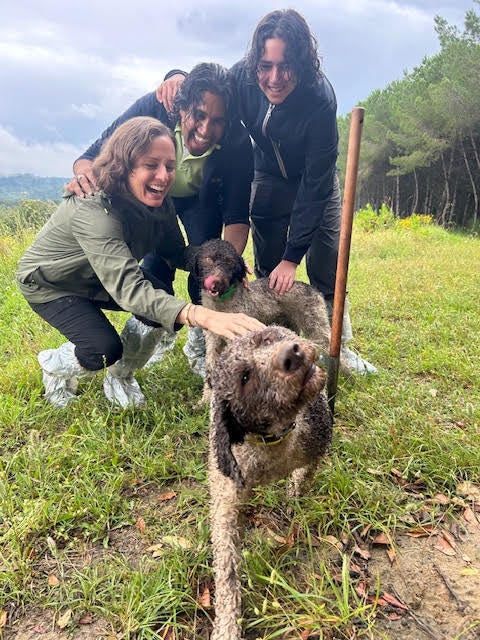I’ve been away from my desk for a couple weeks while on vacation. I really unplugged. So this is a different kind of post. The is the kind of post that is like a before-and-after shot - the before being writings from a mind that is busy and overactive, and the after being writings from a mind that has paused from forward momentum and taken time to simply observe how other people live.
My family spent a good bit of our time in Italy. We saw many wonderful sights and did a bunch of touristy stuff, but we all agreed - our favorite experience by far was truffle hunting. We traveled about an hour outside of Florence, on a rainy day, to meet with a truffle hunter named Andrea and his truffle-hunting dogs Giotto and Bruno, two Lagotto Romagnolos. Other dogs can find truffles, too, but the Lagottos are bred for it. They are renowned for their noses, their drive, and their friggin’ cuteness. And unlike pigs, which truffle families hunted with once upon a time, the Lagottos don’t eat the truffles they find - at least, not many of them.
This truffle hunting excursion gave me a window into the life of a truffle hunter, a way of life that clearly brought Andrea immense pride, satisfaction, and peace. It wasn’t an obvious life for him. He’s not a member of the truffle-hunting-for-four-generations Savini family. He chose to truffle hunt, and in the process, chose what to let go of, chose what he would not do. In his case, he decided to let go of the life he had planned for himself, one in which he left Italy, lived abroad, pursued his ambition of making it in the hospitality industry, and much more.
In other words, this life he led was equally the result of choosing what to keep and of choosing what to take away. This makes me think of Michelangelo, who (supposedly) said that he sculpted by focusing on the negative space rather than the positive, by seeing the potential of the stone and knowing what to take away. 'I saw the angel in the marble, and carved until I set him free.’
Our era is one of excess positivity in which we’re constantly aware of what we want, what we need to achieve, and who we need to be. We must accelerate towards these goals. Perhaps that’s why I’m starting to believe that The Good Life is more about what we set free than what we hold onto.
How do I describe this idea? How do I describe how I felt after speaking with Andrea about the Good Life he created for himself, of what he held onto and what he set free? It wasn’t easy for him, that’s for sure, because it’s hard to know how to live.
So I wrote a poem about it. As you’ll see, I’m not really a poet - although aren’t we all poets, waiting to be released from the page :) - but I hope it gives you a sense of what I felt in the rolling hills and valleys, in the misty woods outside of Florence with Andrea and his dogs and the truffles blooming underground.
The Truffle Hunter
This wasn’t the plan
He was going to travel
Make his own way
But he came back home to work for a summer
At a vinoteca belonging to
The truffle-hunting Savini family
He is not a Savini
And he did not expect to stay
But in the hills and valleys of Tuscany
In Lucca
Where wolves made a comeback
But not the boars
He began to hunt tartufi
The common nero pregiato
The rare bianco, Trifola d’Alba Madonna
The white prized so much that a single one, large enough
Can buy you a villa
…
He came to know the dogs
Giotto the grandad
And Bruno the pup
Lagotto Romagnolo, princes of the woods
They search, scratch, and dig
They know that tartufi, mycelium buds,
Take root beneath the trees
Oak
Spruce
Willow
…
A Lagotto is never bathed in scented shampoo
So as not to overpower the possibility of smelling truffles
A Lagatto is given truffles with mother’s milk
So he learns that this is the thing that brings
Joy
Satisfaction
Relief
Reward
When Bruno, still in training, just 8 months old, finds a truffle, you must exclaim
Bravo, Bruno!
…
He stayed in these woods because We don’t know how to live
And
Living is hard in this world
But life makes sense on the hunt
When, like a bona fide Savini,
He gently eases the truffles out of
The sandy, soft earth
On misty mornings
And lush afternoons
Dogs by his side
…
The skin must not be broken
Is it firm?
Does it smell fresh or rotten?
Does it feel solid or light?
Is it already too dry?
You must smell and press
And wipe the dirt from
The precious little ground dwellers
Wipe the dirt from your hands
And your pants, where Bruno has jumped up
For love and praise
…
How to live
Is walking
Among the trees
On trails barely there
Harvesting
Then remembering to fill in the hole that was dug
So the capillaries return to the ground
For future budding next season
Or the next
…
Giotto, now old at 9 years
Only comes out on cool days
Or in the Fall
For white truffle season
When, flush with success, he eats
Rib eye steak
And lasagna
As rewards for the treasures he finds
…
Giotto works for 4 months, then rests,
Building his energy, but sad
Not to be at work
They must hide from him the fact
Of their expeditions with baby Bruno
Or he will whine at the door for hours
Left behind
…
When Giotto finally retires
He will have a bath with real shampoo
And sleep on the couch
With Andrea
And maybe watch that American film
About truffle hunters




